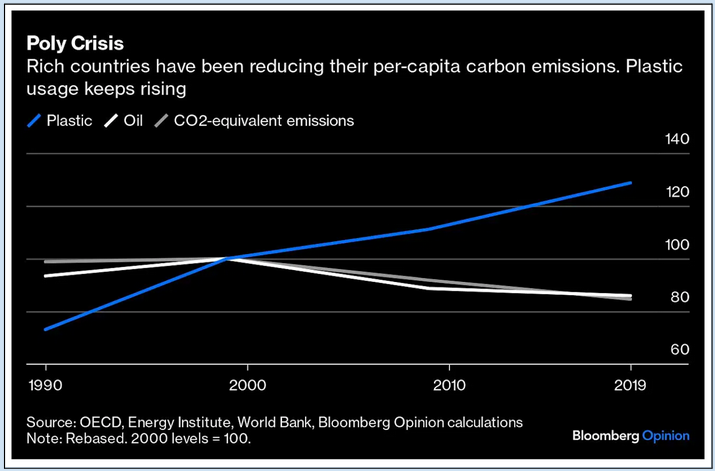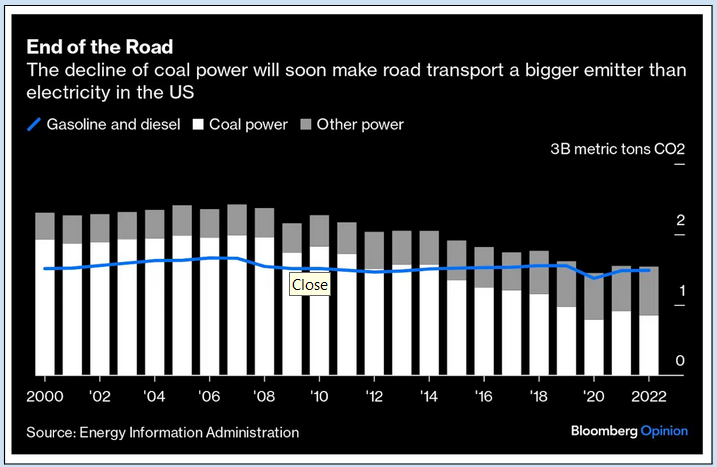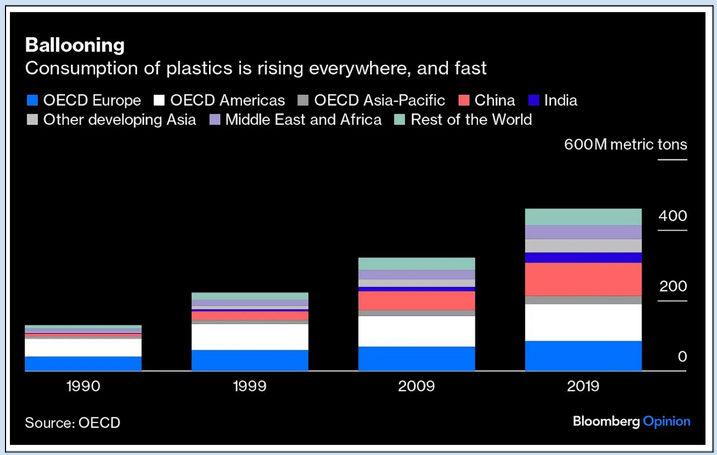To solve the plastics crisis, we need to calm down about plastics
Relevance: GS Paper III
Why in News?
The Center for Climate Integrity, a US nonprofit, has accused oil and chemical companies of greenwashing, i.e., perpetuating a decades-long campaign of fraud and deception about the recyclability of plastics. It highlighted the company's attempts to pretend it was more successful than it really was.
Plastics vis-a-vis other pollutants:
- Enough progress has been made in cutting fossil fuels regarding per-capita carbon emissions and crude oil consumption.
- This has been largely due to efficiency improvements in renewable power and electrification.
- However, plastics have gone in the opposite direction, with people using about 29% more plastic per person in 2019 than at the turn of the millennium.
- This is not because plastics producers have done a more successful lobbying operation than the rest of the fossil fuel industry but because their products are more useful to our lives and harder to substitute with alternatives.
- The issue of plastic waste is complex, with two approaches to address it: reducing consumption and recycling or declaring the process a scam and hoping the problem will somehow go away.
- The first approach is hard and requires fixing things. While the latter approach is tempting, it is unlikely to change much.

Strategies for addressing plastic waste:
- The progress that has been made on the road to net zero comes from three main sources:
- Efficiency, Substitution, and Lifestyle changes.
- To tackle the plastics problem, one must consider which combination of those levers to pull.
- Case for Efficiency:
- To make the usage of plastics more efficient, there is a need to recycle more and shift consumption toward lightweight, thinner containers. This can show real benefits in reducing emissions.
- For instance, members of the Organization for Economic Cooperation and Development have been consuming less gasoline than ever since the 1980s.
- That’s largely caused not by the recent rise of electric cars but by fuel-economy regulations that have been slowly tightening for decades.
- However, efficiency gains can be agonisingly slow.
- In the US, fuel-economy regulations have led to a 9.3% decrease in gasoline usage since 2000, slipping to 1.7% if diesel is added.

- Case for Substitution:
-
- Replacing one technology with another is far more effective.
- By switching away from coal-fired power and towards wind and solar (as well as less-polluting natural gas), emissions from America's grid fell by a third over the same period.
- However, substitution might not work well for plastics, as it depends on the availability of viable alternative technologies.
- Wind and solar power and electric batteries are cheap, scalable, and superior to fossil fuels, but biodegradable and reusable plastics offer few improvements. At the same time, alternatives like glass and aluminum are often worse in terms of climate and the environment.
- Replacing one technology with another is far more effective.
- Case for Lifestyle changes:
- Lifestyle changes, however, are famously difficult to engineer. Every time one buys a clamshell of strawberries, a bottle of water, or a gallon of milk, they decide to use more plastic rather than less.
- As long as consumers and producers continue to favour plastic, consumption will tend to rise, and even widespread public aversion (for instance - Americans consider plastic waste a bigger problem than climate change and air and water pollution) doesn't seem strong enough to control it.

Way forward:
- Efficiency improvements through recycling and light-weighting may be the most effective way to tackle society's excessive use of plastics. In countries like Norway and Japan, it has been proven that when manufacturers are held responsible for disposal costs, significant results can be achieved.
- This highlights the need for strict regulations that the industry may resist.
- It is necessary to establish a strong recycling system that can gain public support and discourage people from simply throwing away their plastics.
Conclusion:
Plastic waste is a massive problem that requires a multifaceted approach to address effectively. This approach should include regulation, technological innovation, changes in consumer behaviour, and industry accountability.
|
Beyond Editorial: According to the United Nations Environment Program (UNEP) - Today, we produce more than 430 million tonnes of plastic waste annually. Prime causes of plastic waste:
Significance of reducing plastic consumption:
|
Related News: Climate impact of plastic pollution

